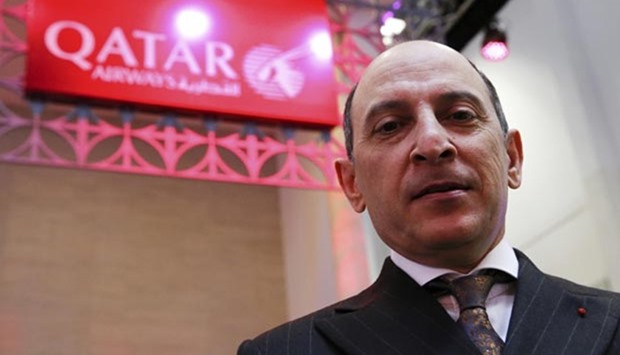*Says low oil prices make deferred A380s viable again
*To start Atlanta route in challenge to Delta
The head of Qatar Airways kept up pressure on US engine maker Pratt & Whitney over delays and technical problems on Wednesday, saying engines for its Airbus A320neo aircraft had not been adequately tested.
Qatar Airways was due to be the first airline to receive the recently revamped aircraft, but has refused to take them because of engine glitches. Last month, it threatened to switch to alternative engine supplier CFM International.
“I don’t think this engine was tested adequately, especially for the temperatures in which Qatar Airways will operate,” Qatar Airways Chief Executive Akbar al-Baker said.
“We will only accept it when we are fully satisfied that it can operate efficiently and safely at Qatar operations (and)...once we get sufficient performance guarantees and undertakings from both Airbus and Pratt and Whitney,” he told a news conference at the ITB tourism exhibition in Berlin.
“We are at the threshold of the walkaway clause in our contract but I hope we will not have to exercise this,” he added.
Al-Baker also disclosed that the airline had deferred delivery of four Airbus A380 superjumbo aircraft by one year at a time when oil prices were high.
But he said Qatar Airways was now prepared to take delivery of the double-decker jets because of the recent drop in fuel costs.
If oil prices stay low, the airline may exercise options for another three aircraft, Al Baker said.
While low oil prices have improved many airlines’ balance sheets, they are also depressing yields on premium traffic due to lower oil producer spending and more conservative business sentiment, he said.
Al-Baker again dismissed claims by major US airlines that they have been harmed by what they describe as illegal subsidies enjoyed by Gulf carriers, including Qatar Airways.
Among eight routes Qatar Airways is adding this year, it plans to start services to Atlanta on June 1, “in order to rub salt into the wounds of Delta,” Al-Baker said.
Atlanta-based Delta Air Lines argues Gulf carriers have breached Open Skies agreements with the United States because of unfair state support, a charge the Middle East carriers deny.

